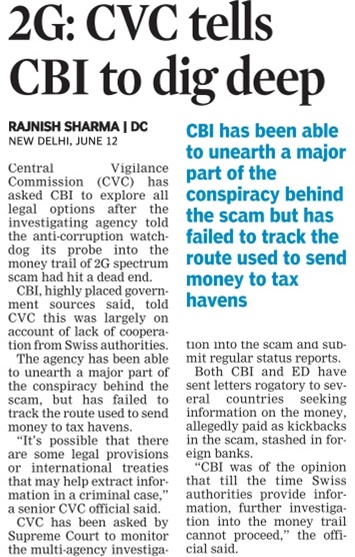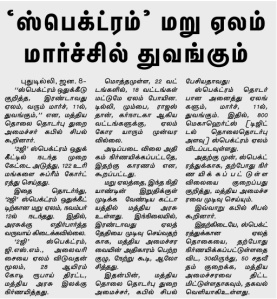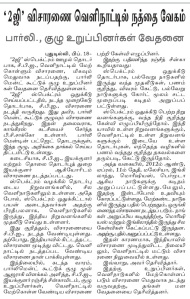BELLIGERENCE AS COVER
WEDNESDAY, 09 MAY 2012 00:20 J GOPIKRISHNAN | NEW DELHI
The UPA Government finds itself caught in a web of deception in its bid to defend Home Minister P Chidambaram’s role in the Aircel-Maxis deal.
On Tuesday, reacting to The Pioneer report on the gross discrepancies on the FIPB approval timing and delay of Aircel-Maxis deal, the Government insisted that the first approval was given on March 7, 2006 and second one for downstream investment on October 3, 2006. Maxis’ subsidiary of Mauritius-based Global Communication Services Holding Ltd invested in Aircel, as claimed by the Government.
However, records nail the Government lie. The facts remain that on March 7, 2006, the Government gave approval to two companies — from USA and Singapore — to raise their stake in Aircel/Global Communication Services Holding Ltd, both Indian firms.
This is established by a PIB Press release dated March 14, 2006 which states that under ‘Economic Affairs’ category (item no : 7 of the PIB Press release on FIPB approvals), M/s Century Telephone Enterprise Inc of USA and M/s Rediongton Pte Ltd were given sanction to enhance their foreign equity of 49 per cent in Aircel/Global Communication Services Holding Ltd to 74%. The value of foreign investment was shown as only Rs 180 crore. Curiously, in this case, Global Communication Services Holding Ltd is shown as an Indian investor along with Aircel.
The PIB release dated March 14, 2006 has no mention of Global Communication Services Holding Ltd acquiring any stake in Aircel. The Pioneer on Tuesday reported that the FIPB approval for the acquisition of Aircel by Global Communication Services Holding Ltd was given only on October 3, 2006.
While insisting that the first FIBP clearance was given to deal on March 7, Government’s Tuesday release claimed that on October 3, FIPB gave subsequent approval for downstream investment by Global Communication Services Holding Ltd in Aircel.
But, throughout the controversy, the Government has not come out with any documents to show that the FIPB under Chidambaram on March 7 gave any clearance to Global Communication Services Holdings Ltd to make any investment in Aircel. Unless the Government comes out with clear evidence to establish this, Chidambaram will find it difficult to deny allegations levelled by the Opposition that he purposefully delayed the clearance to benefit his son Karti.
Terming The Pioneer report on Tuesday as “factually incorrect and totally baseless” the Government on behalf of Ministry of Finance reiterated that FIPB chaired by Chidambaram as Finance Minister approved the deal on March 7, 2006. “Government had earlier issued a Press release on April 28, 2012 regarding the foreign investment made by M/s Global Communication Services Holdings Ltd, Mauritius to acquire 73.99 per cent equity in M/s Aircel Ltd. The contents of that statement are correct and are reiterated,” said the Press release titled “Clarification on AIRCEL issue”.
The Government must also clarify on the companies — Century Telephone Enterprise from USA and Rediongton Pte Ltd. According to the CBI FIR, Maxis invested around Rs 4,000 crore in Aircel by May 2006. Then how did FIPB arrive at foreign investment figure of just Rs 180 crore for increased 25 per cent shares?
Meanwhile, on the same day, March 7, 2006, FIPB under “Telecommunication” category (item No: 19) approved foreign investment of similar named company called BT Global Communication (Mauritius) Ltd. This company got approval to acquire 74 per cent in an unnamed Delhi-based company’s landline telephone operations for around Rs 9 crore.
It is also a mystery how in October 3, 2006, Global Communication Services Holdings Ltd, which was shown as an Indian entity on March 7, became a foreign investor in Aircel and Dishnet on October 3.
http://www.dailypioneer.com/home/online-channel/360-todays-newspaper/63884-govt-trapped-in-own-web-of-deceit.html










































